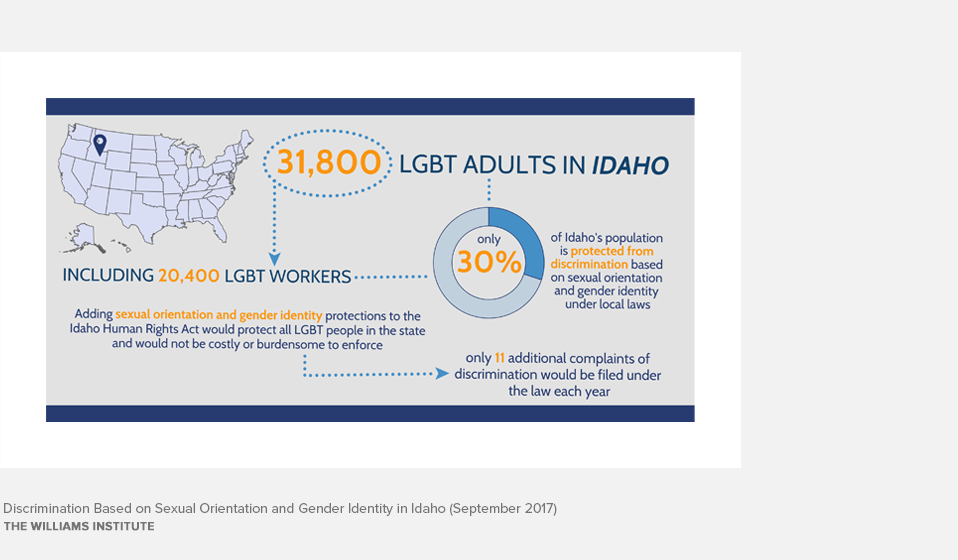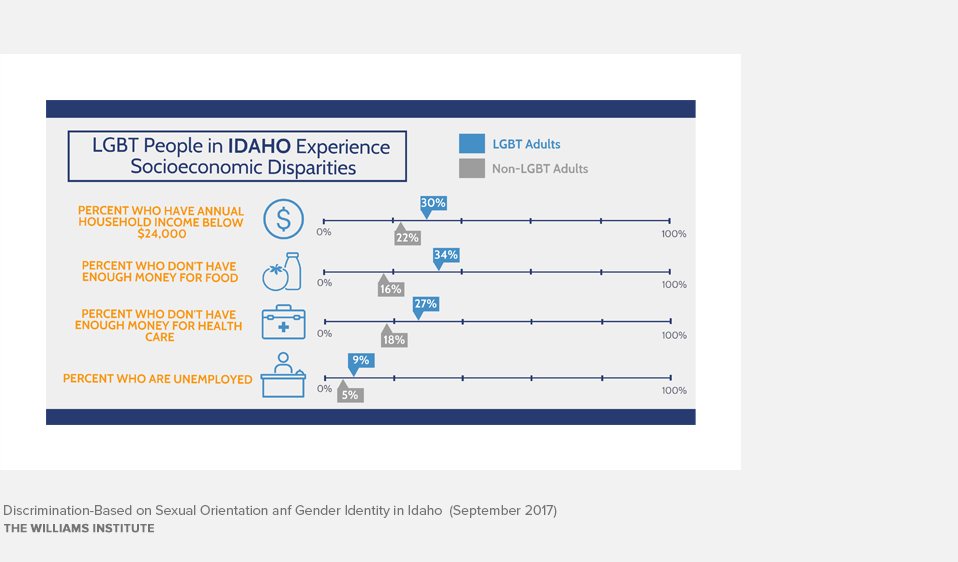Executive Summary
Over 4% of American adults identify as LGBT. Approximately 31,800 LGBT adults live in Idaho. Idaho does not have a statewide law that expressly prohibits discrimination based on sexual orientation or gender identity.
This report summarizes evidence of sexual orientation and gender identity discrimination in Idaho, explains the current protections from sexual orientation and gender identity discrimination in the state, and estimates the administrative impact of adding sexual orientation and gender identity to the state’s existing non-discrimination law.
Key Findings
LGBT People in Idaho Report Experiencing Discrimination and Harassment in Employment, Housing, Public Accommodations, and Other Settings
- An estimated 31,800 LGBT adults live in Idaho. There are over 20,400 LGBT people aged 16 and older in Idaho’s workforce.
- Survey data indicate that discrimination against LGBT people occurs in Idaho. For example, in response to a 2003 survey of more than 1,100 LGBT people in Idaho, over half of the respondents said they felt that they were expected to deny or hide their sexual orientation or gender identity at work. Almost a quarter of those surveyed reported that they believed they had been fired from a job, not promoted, or not received compensation or a raise as a result of anti-gay attitudes in their workplace, and 16.3% of transgender respondents, 12% of gay and bisexual men, and 7.6% of lesbian and bisexual women were expressly told by their employer that their sexual orientation or gender identity had led to such a result.
- In addition, aggregated data from two large public opinion polls conducted between 2011 and 2013 found that 78% of Idaho residents thought that LGBT people experienced discrimination in the state. Another public opinion poll conducted in 2016 found that 56% of Idaho residents thought that gay and lesbian people experienced a lot of discrimination in the U.S. and 57% of Idaho residents thought that transgender people experienced a lot of discrimination in the U.S.
- National survey data on discrimination against LGBT people are consistent with data from Idaho. For example, a national survey of LGBT people conducted by Pew Research Center in 2013 found that 21% of respondents said that they had been treated unfairly by an employer in hiring, pay, or promotions and 23% had received poor service at a restaurant, hotel, or other place of business because of their sexual orientation or gender identity.
- When transgender people are surveyed separately, they report similar or higher levels of discrimination. For example, the 2015 U.S. Transgender Survey, the largest survey of transgender and gender non-conforming people in the U.S. to date, found that 27% of respondents reported being fired, denied a promotion, or not being hired for a job they applied for in the year prior to the survey because of their gender identity; 23% of respondents reported experiencing some form of housing discrimination in the year prior to the survey because of their gender identity; and 31% reported experiencing some form of mistreatment in a place of public accommodation in the year prior to the survey because of their gender identity.
- Reports of discrimination based on sexual orientation and gender identity in Idaho have also been documented in testimony to the state legislature and city councils, administrative complaints, lawsuits, and the media.
LGBT People in Idaho Experience Socioeconomic Disparities
- Research has linked greater socioeconomic disparities for LGBT people to region, a lack of legal protections from discrimination, and less supportive social attitudes toward LGBT people. Data indicate that LGBT people in Idaho experience socioeconomic disparities compared to their non-LGBT counterparts:
- 30% of LGBT adults in Idaho reported having a household income below $24,000 compared to 22% of non-LGBT adults.
- 34% of LGBT adults in Idaho reported that they do not have enough money for food compared to 16% of non-LGBT adults.
- 27% of LGBT adults in Idaho reported not having enough money to meet their health care needs compared to 18% of non-LGBT adults.
- 9% of LGBT adults in Idaho reported being unemployed compared to 5% of non-LGBT adults.
Local Governments, Private Employers, and Public Universities in Idaho Have Made Efforts to Protect LGBT People from Discrimination and Harassment, but Coverage Is Incomplete
- Twelve localities in Idaho have adopted broad local ordinances that prohibit discrimination based on sexual orientation in and gender identity in areas such as private and public sector employment, housing, and public accommodations: Belleview, Boise, Coeur d’Alene, Driggs, Hailey, Idaho Falls, Ketchum, Lewiston, Moscow, Pocatello, Sandpoint, and Victor.
- Approximately 30% of Idaho’s workforce is protected from discrimination under these twelve local ordinances. However, the ordinances do not offer the same scope of enforcement mechanisms and remedies as Idaho’s statewide non-discrimination law, the Idaho Human Rights Act.
- Several of Idaho’s largest corporate employers, including St. Luke’s Medical Center, Micron Technology, Battelle Energy Alliance, Plexus, and Hewlett-Packard, have policies prohibiting discrimination based on sexual orientation and gender identity. In addition, several large public universities in Idaho, including Boise State University, Idaho State University, and the University of Idaho, have adopted policies that prohibit discrimination based on sexual orientation and gender identity in employment and education.
Public Opinion in Idaho Supports the Passage of Non-Discrimination Protections for LGBT People
- A 2014 poll of Idaho residents found that 67% of respondents believed that it should be against state law to discriminate against LGBT people in housing, employment, and public accommodations.
- A statewide poll of Idaho voters conducted in 2011 found that 78% of respondents favored legal protections from discrimination for LGBT people and 93% of respondents thought that skill and ability should be the basis of a person’s employment, not sexual orientation or gender identity.
- In response to a national poll conducted in 2011, 73% of those polled in Idaho said that Congress should pass a federal law to prohibit employment discrimination based on sexual orientation and gender identity.
- A 2008 statewide poll found that 63% of Idaho residents believed it should be illegal to fire an employee because they are perceived to be gay or lesbian.
A Statewide Law Prohibiting Discrimination Based on Sexual Orientation and Gender Identity in Idaho Would Not Be Administratively Burdensome or Costly to Enforce
- Adding sexual orientation and gender identity to the state’s non-discrimination law would result in approximately 11 additional complaints being filed with the Idaho Commission on Human Rights each year.
- The additional 11 complaints of discrimination could likely be absorbed into the existing enforcement system with no need for additional staff and negligible costs.
Download the full report

